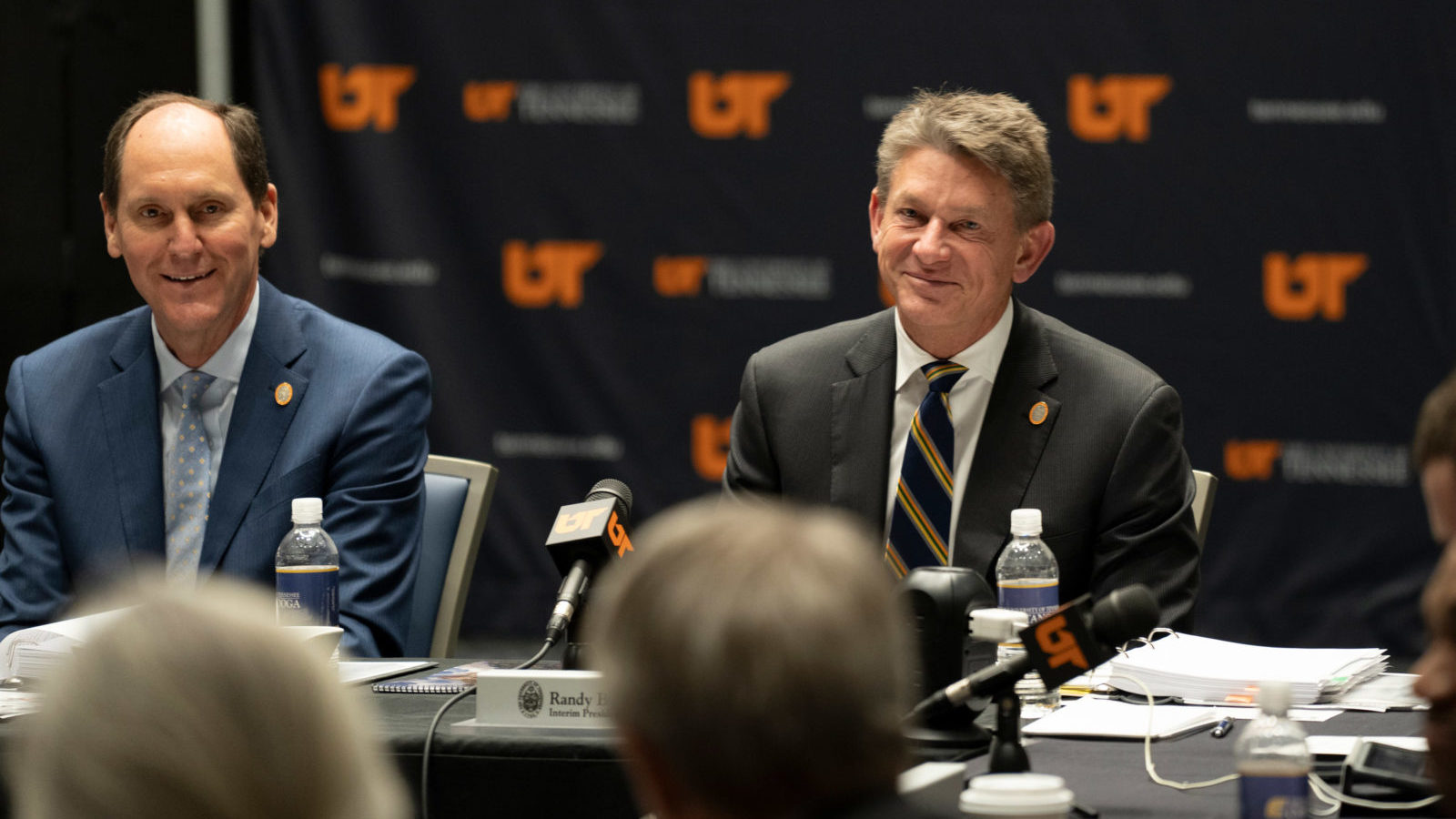
Chattanooga — The University of Tennessee Board of Trustees began the process to consider removing the interim from UT Interim President Randy Boyd’s title during Wednesday’s winter meeting at UT Chattanooga.
Based on positive feedback from Boyd’s review process—including hearing from legislators, University Faculty Council, as well as alumni, staff and student leadership councils and boards—UT Board Chair John Compton said he recommended removing the interim title and extending Boyd’s term as president for a term of five additional years.
Compton said that he wanted to hear from UT’s students, faculty and staff regarding Boyd serving as president.
“I ask that you go campus by campus and state your case,” Compton said to Boyd.
During the campus meetings, Compton asked Boyd to give his vision for moving the University forward and respond to questions from campus constituents.
“Naming the president of the University of Tennessee System is one of our most important decisions that we will undertake as trustees, and I just want to make sure that we are as considerate and comprehensive as possible to all key stakeholders,” Compton said.
After the series of campus visits and review of feedback, a special meeting of the Board will be called to discuss Boyd’s service as president.
Other trustees agreed.
Trustee Kim White called the campus conversations an important piece.
“We need to do it in short order, but we need to do it thoughtfully,” she said.
Trustee Bill Rhodes said, “I think it’s an elegant solution, but we don’t want to drag our feet.”
When Boyd agreed to serve as interim president in 2018, he said he would only serve two years. However, he said, that he has enjoyed serving as president.
“There’s no better job in the state of Tennessee than serving the state of Tennessee through the University of Tennessee,” Boyd said. “I’d be happy to continue serving for a few more years, if you’ll let me.”
Compton’s remarks came after praising Boyd during his one-year performance review Wednesday.
“Randy has had an excellent first year as interim president,” Compton said.
From providing visionary leadership to developing effective relationships with the state legislature and officials and advancing the University’s relationship with the Oak Ridge National Laboratory, Compton said Boyd elicited praise. “His ability to think big, resolve issues and be innovative were listed among his strongest leadership qualities,” Compton said.
As an example, Compton cited Boyd’s creation of UT Promise scholarship to help student access and afford a UT education.
“The UT Promise is a bold step toward eliminating financial barriers to admission and reducing financial burdens for enrolled students,” Compton wrote in his report. “It recognizes the University’s full commitment to all Tennesseans.”
He also praised Boyd’s leadership in hiring UT Knoxville Chancellor Donde Plowman as well as working to raise UT’s research profile through the creation of the Oak Ridge Institute, the reunification of UT Institute of Agriculture and UT Knoxville and the creation of One UT Innovation and Collaboration Grants.
In his address to the board, Boyd said that he wants to use the momentum from 2019 to keep UT moving forward.
“We are committed to making this the greatest decade in the history of the University of Tennessee,” he said. “This is not said with disrespect to those who have come before. I think they expect us to make it the greatest decade….To say we’re going to make it the greatest means it is also one of the greatest challenges.”
Boyd also expressed thankfulness for Gov. Bill Lee’s recommended budget, which includes a 2.5 percent merit pool for faculty and staff pay increase, an additional $2.2 million to hire 32 more extension agents, $5.9 million in additional funds for the UT Health Science Center’s operating and maintenance costs. It also includes $10 million to launch the Oak Ridge Institute (ORI).
In other business, the Board approved UT Health Science Center’s request to reduce out-of-state tuition and fees for three programs (Doctor of Medicine by 10.6 percent, Bachelor of Science in Medical Technology by 54.1 percent and Master of Science in Clinical Laboratory Science by 48.6 percent) and for Master of Cytopathology Practice by 28.3 percent for in-state students and by 54.7 percent for out-of-state students. Tuition and fees for all other programs remain unchanged.
In response to a Board request during the November meeting, Senior Vice President and Chief Finance Officer David Miller presented an analysis of lecturer pay by campus and against peer institutions.
“This is intended to lead to deeper discussions and further study,” Miller said.
Of the more than 550 full-time lecturers across the UT System, the mean salary is just more than $58,000. According to 2018 data, UT Knoxville lecturer and instructor pay is slightly more than peer and SEC universities, but below aspirational schools. UT Chattanooga lecturer and instructor average pay was above peer, aspirational and locally governed institutions. UT Martin was at or above peer, aspirational and other Tennessee universities.
On each campus, Boyd said, the information will be compared on a department-by-department basis.
“This is just the beginning of research to inform our strategies and decisions,” he said, noting lecturers have a great impact on student retention. “We want to be one of the best places to work.”
Boyd said they will report back to the board on the campuses’ strategies. He also said this is part of a larger review of pay across the UT System.
In other business, the trustees approved:
- The appointment of Mark Paganelli as treasurer
- Revised fiscal year 2019-2020 operating budget
- A new Bachelor of Science in Education, Deaf Studies major with American Sign Language concentration and new Master of Legal Studies at UT Knoxville
- 2020 institutional mission profile statements
- Changed the name of the UT Knoxville Haslam College of Business Department of Management to the Department of Management and Entrepreneurship
- UTHSC long-range campus master plan
- Honorary resolution for Ron Maples
Contacts
Melissa Tindellmtindell@tennessee.edu
865-974-0741
Jennifer Sicking
jsicking@tennessee.edu
865-974-5179
